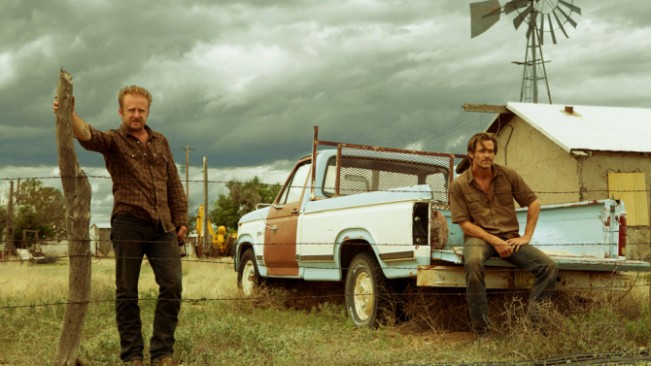By Jake Howell jake.howell@utoronto.ca
Cannes Review: Hell Or High Water
“Three tours of Iraq and no bail-out for people like us,” reads a spray-painted wall in the opening shot of Hell or High Water (formerly Comancheria), a crime drama from David Mackenzie (2013’s Starred Up). With gripping tension and real-world stakes from the get-go, the graffiti message resonates as a reminder of the bitter resentment people have against financial institutions, and that they’re willing to fight back.
First introduced in morning Texas heat wearing ski masks, Chris Pine and Ben Foster play brothers on a relatable mission: quietly tough Toby (Pine) needs to save his ranch from foreclosure, and he’s enlisted ex-con Tanner (Foster) to join him on several minor bank robberies. They’re only interested in robbing $5s, $10s, and $20s, which is another way of saying these are small jobs that only add up to a fraction of the loot we see in most heist films. But by restraining the amount of money to a sum earned on a single episode of “Jeopardy!,” Black List screenwriter Taylor Sheridan ensures we care, as it’s not about that “one last score.” “Poverty is a sickness,” Toby says at one point, and yet it’s expressed by nearly everyone in the film, from the just-getting-by to the generational cowboy.
The script is far better than your average smash-and-grab. It’s a vault of zingers and thoughtful conversations demanded of the genre to stand out, but are rarely delivered as well as they are here. Despite a conventional dynamic, Pine’s calm-and-collected Toby works effectively across Foster’s hotheaded Tanner—but Foster’s performance is unpredictable enough to revel in chaos, which occurs in improvised bank robberies and high speed getaways (set to Nick Cave and Warren Ellis’ somber score; yes, the deck is stacked in this heist pic).
As sheriff and deputy, Jeff Bridges and Gil Birmingham share a hilarious, at times awkward partnership as they doggedly chase their outlaws, slinging slurs and insults over firearms. And just as we’re left worrying there are no interesting women in this overtly masculine two-on-two, a “rattlesnake” waitress takes the pair to task for not ordering their steak correctly.
The concept of having “fun” is a complex cornerstone to these men, and it’s central to the story. Hell or High Water is “fun” in the way that it will garner serious market interest in its consistently entertaining pacing and excellent shoot-out finale, but a little bit deeper and we see these well-developed characters enjoying the narrative more than the audience, which adds to the overall value of this genre entry. “I love West Texas,” Bridges grins as he strolls through town, cracking jokes at crime scenes. But it’s not just West Texas he admires: he’s happy to be working—he’s months from retirement—and his thrills come from the hunt in the same way Tanner’s come from being out of prison and breaking bad again. And as the film becomes more fatal, a rifle-crack results in near-orgasm for the sniper who fired it.













